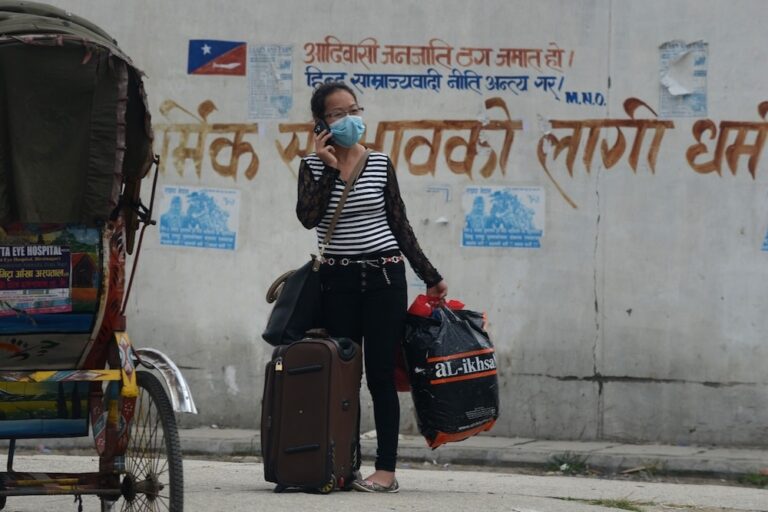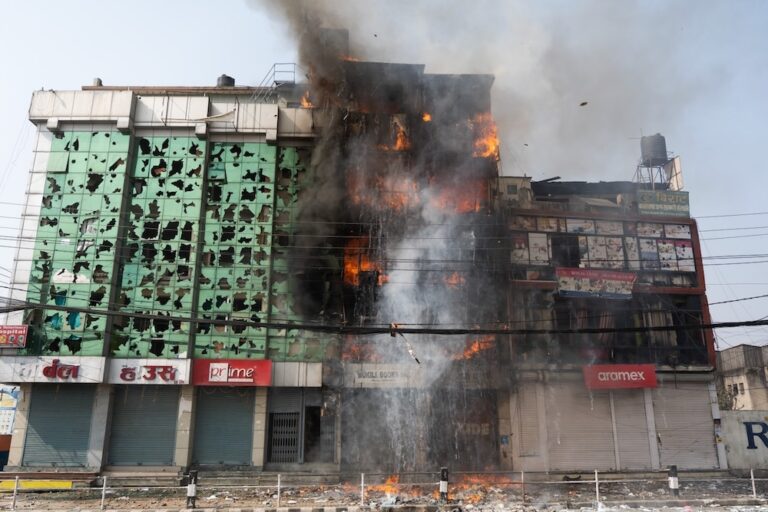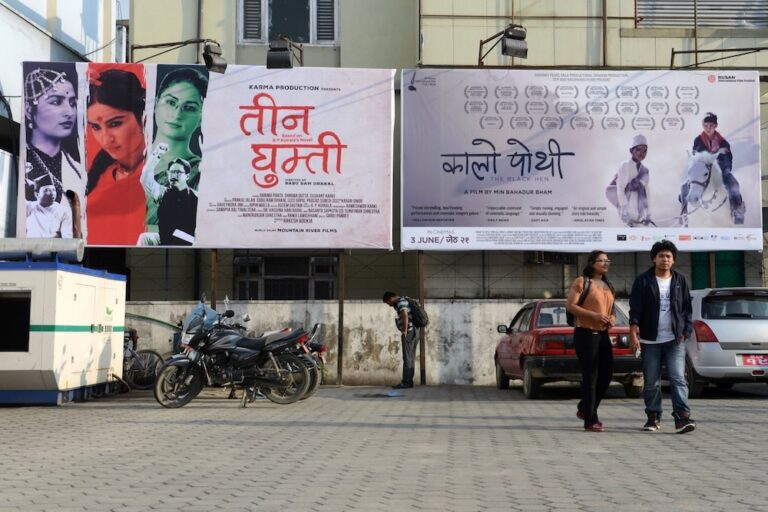The National Human Rights Commission conducted orientation sessions on promoting and implementing freedom of expression mechanisms in Madhesh, Bagmati, Gandaki, and Lumbini provinces.
This statement was originally published on freedomforum.org.np on 11 April 2025.
The members of province mechanisms for protection and promotion of Freedom of Expression (FoE) and Journalists’ Safety were provided orientations on FoE and roles and responsibilities of the mechanism as part of the capacity building.
The National Human Rights Commission (NHRC) conducted orientations to the mechanisms in Madhesh, Bagmati, Gandaki and Lumbini Provinces. The orientations were jointly held for the mechanisms of Gandaki and Lumbini Provinces in the Pokhara city and for mechanisms of Madhesh and Bagmati Provinces in the Hetauda city.
On March 21, NHRC Gandaki and Lumbini province offices jointly held the orientation in Pokhara. In the program chaired by NHRC Secretary Murari Prasad Kharel, NHRC Gandaki Province Chief Nitu Gartaula gave a welcome remark.
Similarly, on March 23, NHRC Madhesh and Bagmati province offices jointly conducted orientation to the mechanisms in respective provinces in Hetauda. NHRC Bagmati Province Chief Pawan Bhatta delivered his welcome remarks in Hetauda.
Following welcome remarks in both events, Joint Secretary at NHRC central office and coordinator of the mechanisms Yagya Prasad Adhikari described why and how the mechanism was formed and what were its challenges. He also shared international practices in Mexico and Columbia about the formation and operation of similar mechanisms.
“As journalists are the frontline human rights defenders and practitioners of free expression, they face various threats and thus, safety mechanism is focused on their protection in addition to the citizens”, Joint Secretary Adhikari underscored, “The mechanism is formed based on the ‘Directive for Formation and Work Procedure for Safety Mechanism on Protection of FoE, 2019’ which was first amended in 2024 provisioning provincial level mechanisms/task force.” He further highlighted that the Directive aligned with the features of Universal Declaration of Human Rights (UDHR), ICCPR (International Covenant on Civil and Political Rights)’s Article 17 and 19. However, the NHRC is facing financial constraints to smoothly operate the committee and mechanisms. He also acknowledged Freedom Forum’s support to the operationalization of mechanism and activities.
“Though the mechanism has not been allocated a separate budget, the NHRC looks forward to suggestions and support from the stakeholders for its smooth functioning and formation of the district networks as well”, Joint Secretary Adhikari shared.
Seconding Joint Secretary Adhikari, Freedom Forum’s Executive Chief Taranath Dahal stated that with the realization of the need for collaborative action for journalists’ rights and safety, this mechanism was mulled especially after the end of conflict in Nepal. He referenced the UNESCO’s UN Plan of Action for safety of journalists as a guiding principle for this initiative. Freedom Forum has been providing FoE violation data to the NHRC. In the previous years, physical attacks were more, but cyber attacks are on the rise nowadays. There are challenges to FoE from policy to practice.
Vagueness of digital sphere is creating trouble, requiring much media/ digital literacy. Thus, the state should own up this instrument and internal capacity building of the mechanism and human rights defenders is equally important, Executive Chief Dahal marked.
Thereafter, NHRC Lumbini Province Chief Hari Parasad Gyawali shared his presentation about the meetings held by the province mechanism and challenges faced for its continuation. Major challenges were:
- Scattered and distant locations of member organizations, financial difficulties, etc.
- No separate budget allocated for functioning of the mechanism
- Transfer of the members of mechanism to different offices/ ministries, thereby affecting institutionalization of the mechanism’s activities
For its sustainability, he stressed regular meetings; regular monitoring; periodic orientation to the members and other concerned stakeholders; preparation and issuance of public quarterly report of the mechanism works.
Seconding Gyawali, Gandaki Province Chief Nitu Gartaula presented on Gandaki Provnce mechanism’s activities. She pointed out major problems in smooth functioning of the mechanism at the province.
According to her, collaborative working modality among members especially in monitoring/issuing press release on violation of press freedom should be redefined. In some cases, journalists should also follow the code of conduct to avoid conflict. Investigation power of NHRC must not be duplicated and displaced by investigation mechanism under the Directive. She also expressed concern over budget constraint for efficient operation of mechanism.
Further, Bagmati Province Chief Pawan Bhatta shared his presentation on status of FoE in the province and way forward for its protection and promotion. Chief Bhatta described the noted incidents of FoE violation in the province and said that in some cases violations go unnoticed and some end with reconciliation.
According to Bhatta and members, challenges in functioning of mechanism Bagmati Province are: lack of clear understanding about the directive and mechanism among members; difficulty in cooperation and coordination due to frequent transfer of the members and financial challenges to continue meetings and field visits.
He suggested to have a member secretary to the mechanism’s for efficient functioning; periodic orientation and training to the members on their duties and responsibilities; no duplication with other existing mechanisms in the NHRC.
Moreover, Media Monitoring Officer at Freedom Forum (FF), Nanu Maiya Khadka, presented on how FoE and journalists rights were monitored and verified by FF, what were the challenges and way forward for effective monitoring which would support the NHRC mechanism.
She also shared data for violation of press freedom and FoE recorded at FF and the mechanism’s contribution to ensure justice to victims in the violation cases. She emphasized that investigative journalists were targeted in most cases, and censorship on digital platforms was the biggest challenge for FoE in coming days.

Members of the mechanisms and concerned stakeholders expressed their commitment to actively participate in the meetings and cooperate among themselves to protect FoE in their respective provinces.
Participants from both the provinces discussed:
- Proper resource mobilization is important for sustainability of the mechanisms,
- Present challenge in FoE is major political parties targeting media, public distrust in media,
- Journalists violating professional ethics,
- Growing censorship and syndicate in journalism leading to the missing out of anti-press incidents from the sight of mechanism, so expansion of taskforce at district level is imperative.
- Nepal Police’s commitment to FoE, Right to Information and human rights.
- The High Court Bar’s cooperation with lawyers to plead for journalists for free of cost in case of need.
- Mechanism members’ institutional memory sought to facilitate knowledge transfer after their transfer or appointment,
- Journalists’ and citizen’s rights are at stake when there is political instability, so active functioning and visibility of mechanism is essential
Joint Secretary Adhikari addressed the concerns of the participants and said that the mechanism was at initial phase of operation so suggestion from all was expected. “Regarding financial challenges, we can adopt a cost effective method while enforcing activities under the Directive such as conducting meetings through online medium, swift communication among members through messaging applications and NHRC province 0ffices’ active role in coordination among members,” he reminded.
In the concluding session of the programs, NHRC’s Secretary Murari Prasad Kharel said that the concept of mechanism is a value add to NHRC’s work. “Security of informati0n, security of media equipment and employment are also important to ensure FoE and journalists’ safety. Collective ownership from all sectors is needed for effective functioning of the mechanisms at all levels,” he stressed.
He suggested that the mechanism should work not only in a reactive way but also in a proactive way so that it can function as a watchdog, for instance- review of the policies, regular monitoring of FoE and journalists’ safety in provinces can also be mulled by it. Secretary Kharel called upon all the participants to actively participate in regular meetings, even utilizing digital medium if required. The members should clearly understand the provisions in the Directive and jurisdiction of the mechanism.
Lastly, Secretary Kharel vowed to make the mechanism effective because, he argued, it was an example of the integrated approach of FoE protection and journalists’ safety.



